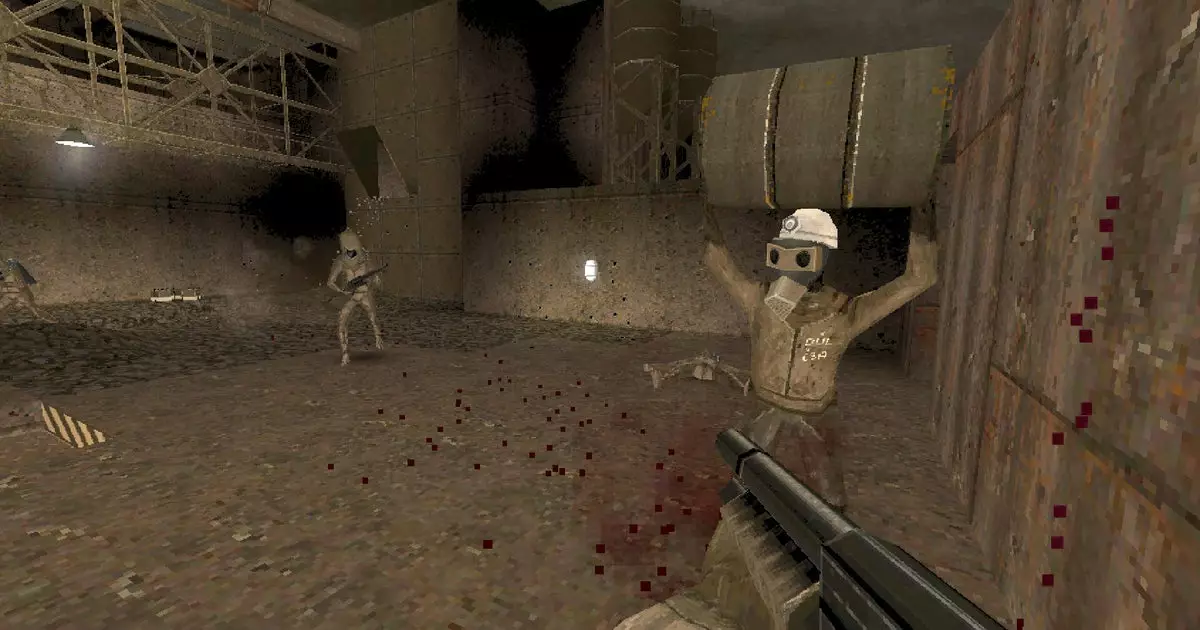The gaming landscape is often peppered with both innovative designs and perplexing bugs. One such instance can be found in “Hrot,” a shooter inspired by the classic Quake series. Despite its commendable graphics and engaging gameplay, recent issues have surfaced that have both amused and frustrated players. The glitch at hand involves an unexpected feature: dogs that bark in a relentless loop. Developer Spytihněv recently addressed this odd phenomenon, revealing that it has afflicted players for a year and a half, particularly those using Linux-based systems.
At first glance, a dog barking in a video game may seem like a trivial concern. However, when that barking transitions into an unbearable loop, it transforms from an innocuous detail into a significant detractor from the player experience. Spytihněv acknowledged the grievances of players, some of whom had written negative reviews directly related to these canine vocalizations. The developer’s response indicates that perhaps these weren’t merely complaints from an easily annoyed audience, but rather sincere issues that distracted from the overall game quality.
The absurdity of the situation is evident. In “Hrot,” feeding a dog to silence it even for a brief moment—until it inevitably starts yapping again—raises questions about how bugs like this manage to escape the developer’s attention for so long. By acknowledging this glitch, Spytihněv has taken a commendable step toward rectifying the player experience, illustrating that even in the realm of game development, challenges can surprise even the most seasoned developers.
The response from the gaming community has been varied. While there is humor to be found in the bewilderment of players confronted with barking dogs, the underlying frustrations speak to a larger issue. Players who struggled to navigate levels filled with the incessantly barking “ratters” understandably felt that the game was rendered unplayable at times. Steam comments reflected both amusement and annoyance, emphasizing that this bug did not just impede gameplay; it altered the immersion players come to expect from a modern shooter.
Moreover, the juxtaposition of a game that combines serious themes—like socialist commentary and nuclear anxiety—with an annoying audio glitch demonstrates the unpredictability inherent in video game development. It raises an interesting paradox; can a game be taken seriously with such eccentricities at play? The reality is that this issue has ironically provided a unique focal point for discussions surrounding the title, highlighting how bugs can unexpectedly define the player experience.
Beyond the barking dogs, it is crucial to appreciate what “Hrot” aims to present. The game is steeped in historical context, featuring nods to Czechoslovakian culture and political commentary. Game reviewers have pointed out meticulously crafted scenes where players navigate through eerie landscapes reminiscent of abandoned buildings tied to the region’s history. The dialogue surrounding the game often focuses on its artistic aspirations and narrative elements, which thrive in contrast with the silliness of a bug like infinite barking.
Various plot twists, including combating doppelgangers and absurd caricatures of political figures, further enrich the game’s quirky offerings. This blend of the highbrow and the bizarre creates an intricate tapestry that invites players to explore deeper meanings while also confronting bizarre gameplay challenges.
Spytihněv’s recognition of the barking glitch signals a commitment to improving his craft. Following “Hrot,” the developer has shifted his focus, attempting to redefine his creative avenue through a retro RTS titled “Shrot.” This transition away from shooting mechanics toward strategic gameplay might present Spytihněv with new hurdles—but perhaps also an opportunity to learn from the past. Addressing player feedback will be essential as he delves into new territories in game design.
While the infinite barking dogs in “Hrot” might seem a trivial issue on the surface, it embodies larger themes of player experience, immersion, and the unpredictable nature of game development. As the developer moves forward, the lessons learned from this curious glitch could foster growth while inspiring future innovations in the gaming industry.

